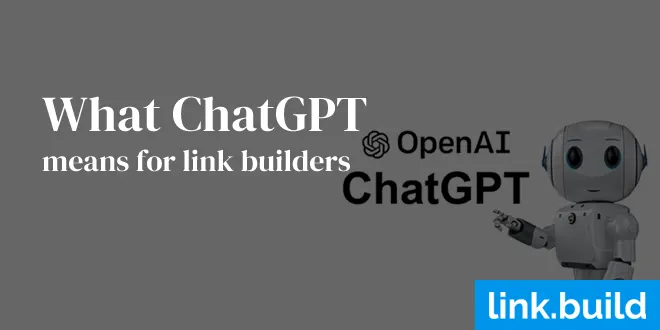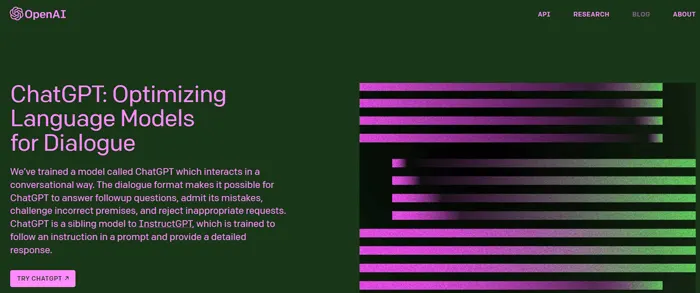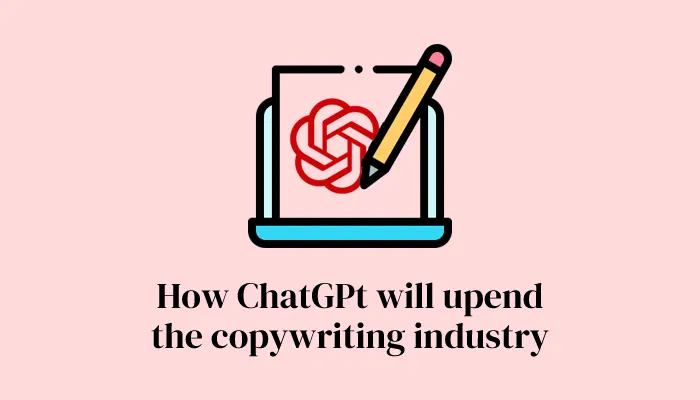
A new AI-powered chatbot called ChatGPT is about to disrupt the link building industry, but not in the way you might think.
Do some people worry? Yes, they do! They fear that these smart AI bots might take over search engines one day. That could mean goodbye SEO and even overall search marketing!
But hold on a second; there’s more behind this story.
Contrary to fears, ‘ChatGPT for link building’ is proving itself as less of a menace and more of an ally.
Where does broken-link-building come into play here? Well with ChatGTP picking up pace rapidly, it can transform your regular “link building processes” making them super effective
It opens up numerous unseen “link building opportunities”. Plus hunting down relevant websites becomes easier than before when using such technologies enhancing the entire process significantly.
Contents
- What exactly is ChatGPT?
- How will ChatGPT change link building?
- Will ChatGPT and AI be used to scale link building?
- Large language models have limitations
- Successful ChatGPT link building requires a human touch
- What Google thinks about AI-generated content
- How ChatGPt will upend the copywriting industry
- Will AI-generated content deter readers?
- Will ChatGPT become a standard tool for link builders?
What exactly is ChatGPT?

ChatGPT is an AI-powered chatbot trained to interact with users in a conversational manner by discerning user intent. Developed by San Francisco-based AI research and deployment company OpenAI, this chatbot is based on the Generative Pretrained Transformer language model and uses deep learning to produce conversational responses to user inquiries.
This isn’t just any ordinary chatbot–think of it more as an interaction maestro that takes our words or prompts to weave beautiful sentences. Using its foundation of deep learning techniques known as Reinforcement Learning with Human Feedback (RLHF), ChatGPT becomes one step closer to understanding the human mind every day; becoming better at responding exactly how we want.
Now imagine this: you need content expressed like Shakespeare wrote it? Or perhaps in Donald Trump’s distinctive voice? All possible – simply say so!
Why does that sound such a big deal?
Well, let me explain.
Suppose you’re looking for successful link building strategies. In response, not only will ChatGPT generate engaging discussions around high authority websites and broken links repair ideas but also provide suggestions related to relevant keywords catering specifically towards your target audience – all making optimizing SEO fun again!
More remarkably though—by using natural language processing—it can even brainstorm unique ‘link magnet’ ideas on demand—a total game changer.
How will ChatGPT change link building?

In order to understand how ChatGPT will impact link building campaigns, you need to know how this technology supplements the limitations of the traditional search engine.
For the last several decades, search engines like Google, Bing, and Yahoo have been an excellent resource for finding information online. For example, if you’re searching for attorneys in Houston, you’ll get a list of law firm business listings and other websites to choose from. However, it can be difficult to find answers to complex questions.
When your searches are nuanced, web pages that turn up in the search engine results pages (SERPS) might not contain the in-depth content you seek.
Even when in-depth content appears in the SERPs, you still have to click around and read several pages just to find answers to your question.
Most of the time, you’ll need to visit several websites to get all the information you need, and this takes a lot of work. This is where ChatGPT changes the search game.
ChatGPT aims to answer complex, nuanced questions conversationally, which has the potential to transform the way users retrieve information from the internet. Instead of making users sift through an endless sea of websites that may or may not provide answers, ChatGPT provides users with the best possible answer derived from multiple sources. All this happens in a chatbot that makes people feel like they’re having a conversation with a real human.
Picture this: you ask a chatbot how to make the best sausage lasagna, and it gives you a recipe, some photos, and tells you exactly how to make the dish. You don’t have to scroll through search results, and you don’t have to worry about clicking on a page where the recipe is buried in the middle of a long dissertation about the history of lasagna.
When it comes to link building, it means content writers can (and already do) use ChatGPT for guest posting and other traditional marketing tasks, but now with the scale of a bot.
Will ChatGPT and AI be used to scale link building?
A big part of link building services involves content writing, and this chatbot can be used to generate that content. Building links with AI-generated content will allow businesses to scale their link-building efforts at lightning speed since they won’t need to wait for content writers to produce the copy, which can sometimes take days or weeks.
Businesses can also use this technology to scale their link building efforts more affordably since using this tool is cheaper than hiring content writers. If an AI chatbot can do a decent job quickly, that will amount to time and money saved.
Large language models have limitations
Although many businesses are already using AI text-generation technology, it isn’t perfect. In fact, it has quite a few flaws and has a long way to go before it can be considered reliable. For example, most AI-generated content isn’t as good as content written by a human. Output quality depends on input quality. You have to know how to write a good prompt to get a good answer. Even so, answers aren’t always correct. For instance, one person asked ChatGPT, “What mammal lays the largest eggs?” and the answer was, “The mammal that lays the largest eggs is the elephant.”
Although AI can write decent product descriptions, poems, and general content, it lacks the ability to go in-depth to elicit strong emotion from readers, which is what drives sales and conversions. Although it has the potential to replace general content created by humans, it can’t replace the expertise of an experienced copywriter who can craft content that speaks directly to a specific audience.
Ultimately, businesses can use AI to generate content, but it won’t necessarily get people to click, sign up for an outreach emails list, initiate a download, or buy a product/service. Achieving these results requires human-generated content. However, businesses can use both AI and human copywriters to get the best results.
Successful ChatGPT link building requires a human touch
For businesses using ChatGPT for link building, a manual check is vital. It’s smart to tune up the generated content and perhaps bolster it further. For in-depth industry pieces though, starting from scratch might be quicker than remodeling general articles.
The use of an AI text generator does help when creating simple write-ups effectively with few human touches needed; maybe just an ending call-to-action where necessary! So yes, generating link magnet ideas with ChatGPT is entirely possible!
However, remember this – search engines like Google won’t take kindly to subpar work.
Let’s talk about automating your business’s processes such as crafting meta descriptions or participating in relevant online communities through effective site optimization techniques.
With advanced tools now available that can identify broken links fast and reliably, it makes sense why they’re becoming more popular among digital marketers seeking better ways to automate their SEO tasks. While still managing high-quality standards set forth by these powerful search algorithms.
Lastly, Generating content has never been easier thanks to modern AI tools which have truly revolutionized our approach towards digital marketing today- making lives so much simpler yet achieving results beyond imaginable before its advent.
What Google thinks about AI-generated content
In early 2022, Google’s Search Advocate, Matt Mueller, announced that AI-generated content has always been against Google’s Webmaster Guidelines and could lead to a manual penalty. However, in 2023, Google changed this stance and officially announced that it won’t ban AI content from being included in search results, and won’t treat it any differently from standard content.
Now, Google doesn’t care if content is created by a human or an artificial intelligence bot as long as it satisfies all aspects of E-E-A-T. When content is good, it will be ranked in the SERPs according to basic SEO principles that apply to all content. Poor-quality content may not do well in the SERPs, regardless of how it was created.
Google is starting to fight hard against AI-content by simply deindexing or suppressing large portions of the web.
How ChatGPt will upend the copywriting industry

Since Google now allows AI-generated content without the threat of a penalty, this will change the copywriting industry in several ways – some good, some bad. Although ChatGPT won’t eliminate the need for human-created content, it will transform all sides of the industry.
1. Widespread access to content creation
With AI-generated text, content marketing and link building will become available to businesses who previously couldn’t afford to hire content writers on a regular basis. It will cost less to use the ChatGPT platform than to hire a full team of writers.
2. Lower demand for human-created general content
On the other side of the coin, copywriters and content writers will see a drop in demand for general work. For example, if AI can write good product descriptions and basic informational articles, businesses won’t need to hire copywriters for those tasks (e.g. keyword research and content gap analysis).
3. Increased demand for expertise
Once AI can reliably take care of general content needs, copywriters will need to be exceptionally skilled in their craft and have some kind of specialization to get client work. The bar will be raised for the entire industry since amateurs and dabblers won’t be able to outprice an AI bot that produces the same quality of work.
4. Cheaper outsourced content creation
Yet another aspect to consider is the potential for cheaper outsourced content creation through marketing agencies who use ChatGPT.
Businesses working with a digital marketing agency using AI can get their content created quickly and efficiently. There will no doubt be a demand for this service, so marketing agencies will need to prepare by learning how to generate content from AI.
5. Businesses with big SEO budgets will thrive
Businesses with a strong SEO game will have an advantage when AI-generated text becomes mainstream. When a large number of businesses in the same industry start using ChatGPT to generate content, it will level the basic playing field where SEO is concerned. However, businesses that have a strong SEO link building strategy and tweak AI-generated content to add a human touch will likely see better SERP rankings, get more clicks, and generate more leads and sales.
Will AI-generated content deter readers?
Although people say they don’t want it, you might be surprised to learn that many people can’t identify AI-generated content, but that shouldn’t be a surprise. Most content on the internet is generic, and AI-powered text generators have been trained with this type of text. However, several things reveal AI as the creator, like obviously false information that seems convincing, odd phrases, disjointed sentences, and boring facts.
Bots can also identify AI-generated text. In January 2023, OpenAI launched their own tool designed to detect AI-generated copy, although this version still makes errors. It’s accurate about 26% of the time, but falsely identifies human-written content as AI-generated about 9% of the time. It’s not perfect yet, but will undoubtedly improve as time passes.
There’s no reason to believe AI-generated content will deter visitors if it’s well-written and answers their questions. With that said, it begs the question: what happens when AI generates misinformation that gets published to the internet, and people don’t know it was written by a bot? If people aren’t aware that content was created by AI, they’ll be more likely to believe the information, especially if it comes from a reputable company. This has the potential to hurt a business’ reputation.
While experts will know right away when their generated content is off, new business owners working in an unfamiliar industry may not notice every error. In this case, Google rankings might drop as the company will seek to suppress this content in the SERPs and publishers might reject article submissions. Worst case scenario, visitors will notice and experience a loss of trust in the business that published the misinformation.
To avoid this, business owners who use ChatGPT or any form of AI-generated need a quality control system to review content and correct misinformation.
Will ChatGPT become a standard tool for link builders?
You can’t have too many tools when running a link building campaign, and ChatGPT will probably become an indispensable tool for search engine marketers and SEO professionals.
Although a chatbot may never replace traditional search engines, ChatGPT has the potential to revolutionize the search industry. With a solid partnership and a multi-billion-dollar investment from Microsoft, it’s safe to say ChatGPT will do well once it’s fully developed.
Tim has spent more than two decades in organic online marketing, working with some of the most well-recognized online brands in scaling their content marketing campaigns.
Connect with Tim on Linkedin & Twitter.
- How to Create More Linkable Content in the Age of AI - May 1, 2025
- Link Cost vs. Link Value: How to Balance the Equation - April 18, 2025
- Are Reciprocal Links Too Risky to Try? - February 21, 2025
